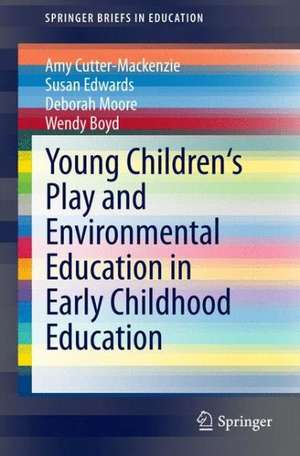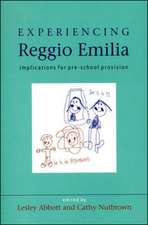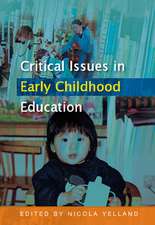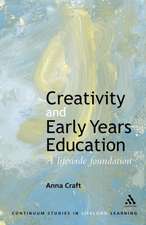Young Children's Play and Environmental Education in Early Childhood Education: SpringerBriefs in Education
Autor Amy Cutter-Mackenzie, Susan Edwards, Deborah Moore, Wendy Boyden Limba Engleză Paperback – 28 ian 2014
In the book ‘Beyond Quality in ECE and Care’ authors Dahlberg, Moss and Pence implore readers to ask critical questions about commonly held images of how young children come to construct themselves within social institutions. In similar fashion, this little book problematizes the taken-for-grantedness of the childhood development project in service to the certain cultural narratives. Cutter-Mackenzie, Edwards, Moore and Boyd challenge traditional conceptions of play-based learning through the medium of environmental education. This book signals a turning point in social thought grounded in a relational view of (environmental) education as experiential, intergenerational, interspecies, embodied learning in the third space. As Barad says, such work is based in inter-actions that can account for the tangled spaces of agencies. Through the deceptive simplicity of children’s play, the book stimulates deliberation of the real purposes of pedagogy and of schooling.
Paul Hart, University of Regina, Canada
Din seria SpringerBriefs in Education
-
 Preț: 317.28 lei
Preț: 317.28 lei -
 Preț: 478.71 lei
Preț: 478.71 lei - 20%
 Preț: 387.43 lei
Preț: 387.43 lei - 17%
 Preț: 392.10 lei
Preț: 392.10 lei -
 Preț: 196.30 lei
Preț: 196.30 lei -
 Preț: 394.40 lei
Preț: 394.40 lei -
 Preț: 356.31 lei
Preț: 356.31 lei -
 Preț: 444.52 lei
Preț: 444.52 lei -
 Preț: 196.15 lei
Preț: 196.15 lei -
 Preț: 262.86 lei
Preț: 262.86 lei -
 Preț: 370.60 lei
Preț: 370.60 lei -
 Preț: 376.59 lei
Preț: 376.59 lei -
 Preț: 379.68 lei
Preț: 379.68 lei -
 Preț: 408.44 lei
Preț: 408.44 lei -
 Preț: 376.22 lei
Preț: 376.22 lei -
 Preț: 378.34 lei
Preț: 378.34 lei -
 Preț: 346.59 lei
Preț: 346.59 lei -
 Preț: 377.18 lei
Preț: 377.18 lei -
 Preț: 377.35 lei
Preț: 377.35 lei -
 Preț: 476.03 lei
Preț: 476.03 lei -
 Preț: 376.43 lei
Preț: 376.43 lei -
 Preț: 379.48 lei
Preț: 379.48 lei -
 Preț: 479.29 lei
Preț: 479.29 lei -
 Preț: 340.61 lei
Preț: 340.61 lei -
 Preț: 377.18 lei
Preț: 377.18 lei -
 Preț: 377.57 lei
Preț: 377.57 lei -
 Preț: 376.59 lei
Preț: 376.59 lei -
 Preț: 377.18 lei
Preț: 377.18 lei -
 Preț: 380.84 lei
Preț: 380.84 lei -
 Preț: 379.09 lei
Preț: 379.09 lei -
 Preț: 354.09 lei
Preț: 354.09 lei -
 Preț: 377.95 lei
Preț: 377.95 lei -
 Preț: 379.68 lei
Preț: 379.68 lei -
 Preț: 377.35 lei
Preț: 377.35 lei -
 Preț: 346.59 lei
Preț: 346.59 lei -
 Preț: 444.52 lei
Preț: 444.52 lei -
 Preț: 376.22 lei
Preț: 376.22 lei -
 Preț: 381.21 lei
Preț: 381.21 lei -
 Preț: 348.13 lei
Preț: 348.13 lei -
 Preț: 409.25 lei
Preț: 409.25 lei -
 Preț: 410.17 lei
Preț: 410.17 lei -
 Preț: 377.57 lei
Preț: 377.57 lei -
 Preț: 380.63 lei
Preț: 380.63 lei -
 Preț: 376.59 lei
Preț: 376.59 lei -
 Preț: 377.57 lei
Preț: 377.57 lei -
 Preț: 380.07 lei
Preț: 380.07 lei -
 Preț: 378.54 lei
Preț: 378.54 lei -
 Preț: 379.48 lei
Preț: 379.48 lei -
 Preț: 377.73 lei
Preț: 377.73 lei -
 Preț: 342.74 lei
Preț: 342.74 lei
Preț: 443.36 lei
Nou
Puncte Express: 665
Preț estimativ în valută:
84.83€ • 88.81$ • 70.20£
84.83€ • 88.81$ • 70.20£
Carte tipărită la comandă
Livrare economică 05-19 aprilie
Preluare comenzi: 021 569.72.76
Specificații
ISBN-13: 9783319037394
ISBN-10: 3319037390
Pagini: 100
Ilustrații: XI, 88 p. 16 illus.
Dimensiuni: 155 x 235 x 5 mm
Greutate: 0.15 kg
Ediția:2014
Editura: Springer International Publishing
Colecția Springer
Seria SpringerBriefs in Education
Locul publicării:Cham, Switzerland
ISBN-10: 3319037390
Pagini: 100
Ilustrații: XI, 88 p. 16 illus.
Dimensiuni: 155 x 235 x 5 mm
Greutate: 0.15 kg
Ediția:2014
Editura: Springer International Publishing
Colecția Springer
Seria SpringerBriefs in Education
Locul publicării:Cham, Switzerland
Public țintă
ResearchCuprins
1. A Challenge for Early Childhood Environmental Education?; Amy Cutter-Mackenzie & Susan Edwards.- 2. Play-based Learning in Early Childhood Education; Deborah Moore & Susan Edwards.- 3. Environmental Education and Pedagogical Play in Early Childhood Education; Susan Edwards & Amy Cutter-Mackenzie.- 4. Jeanette: Pond Life; Amy Cutter-Mackenzie & Wendy Boyd.- 5. Josh: Small is Beautiful; Wendy Boyd & Amy Cutter-Mackenzie.- 6. Robyn: Worms Underground; Deborah Moore & Susan Edwards.- 7. A Challenge Reconsidered: Play-based Learning in Early Childhood Environmental Education; Susan Edwards & Amy Cutter-Mackenzie.
Recenzii
In the book ‘Beyond Quality in ECE and Care’ authors Dahlberg, Moss and Pence implore readers to ask critical questions about commonly held images of how young children come to construct themselves within social institutions. In similar fashion, this little book problematizes the taken-for-grantedness of the childhood development project in service to the certain cultural narratives. Cutter-Mackenzie, Edwards, Moore and Boyd challenge traditional conceptions of play-based learning through the medium of environmental education. This book signals a turning point in social thought grounded in a relational view of (environmental) education as experiential, intergenerational, interspecies, embodied learning in the third space. As Barad says, such work is based in inter-actions that can account for the tangled spaces of agencies. Through the deceptive simplicity of children’s play, the book stimulates deliberation of the real purposes of pedagogy and of schooling.
Paul Hart, University of Regina, Canada
Paul Hart, University of Regina, Canada
Textul de pe ultima copertă
In an era in which environmental education has been described as one of the most pressing educational concerns of our time, further insights are needed to understand how best to approach the learning and teaching of environmental education in early childhood education. In this book we address this concern by identifying two principles for using play-based learning early childhood environmental education. The principles we identify are the result of research conducted with teachers and children using different types of play-based learning whilst engaged in environmental education. Such play-types connect with the historical use of play-based learning in early childhood education as a basis for pedagogy.
In the book ‘Beyond Quality in ECE and Care’ authors Dahlberg, Moss and Pence implore readers to ask critical questions about commonly held images of how young children come to construct themselves within social institutions. In similar fashion, this little book problematizes the taken-for-grantedness of the childhood development project in service to the certain cultural narratives. Cutter-Mackenzie, Edwards, Moore and Boyd challenge traditional conceptions of play-based learning through the medium of environmental education. This book signals a turning point in social thought grounded in a relational view of (environmental) education as experiential, intergenerational, interspecies, embodied learning in the third space. As Barad says, such work is based in inter-actions that can account for the tangled spaces of agencies. Through the deceptive simplicity of children’s play, the book stimulates deliberation of the real purposes of pedagogy and of schooling.
Paul Hart, University of Regina, Canada
In the book ‘Beyond Quality in ECE and Care’ authors Dahlberg, Moss and Pence implore readers to ask critical questions about commonly held images of how young children come to construct themselves within social institutions. In similar fashion, this little book problematizes the taken-for-grantedness of the childhood development project in service to the certain cultural narratives. Cutter-Mackenzie, Edwards, Moore and Boyd challenge traditional conceptions of play-based learning through the medium of environmental education. This book signals a turning point in social thought grounded in a relational view of (environmental) education as experiential, intergenerational, interspecies, embodied learning in the third space. As Barad says, such work is based in inter-actions that can account for the tangled spaces of agencies. Through the deceptive simplicity of children’s play, the book stimulates deliberation of the real purposes of pedagogy and of schooling.
Paul Hart, University of Regina, Canada
Caracteristici
Interfaces contemporary perspectives in environmental education and sustainability with approaches to play based learning Moves beyond and challenges traditional notions of environmental learning in early childhood education Presents guiding principles to value the pedagogical potential of different play-types in early childhood environmental education Showcases the pedagogical work of teachers and children using different types of play-based learning to engage in environmental education Includes supplementary material: sn.pub/extras









